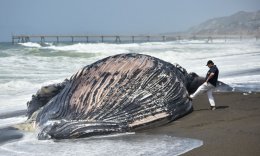Global warming and marine life
 Continued warming of the Earth’s oceans over the next century could trigger disruptions to marine life on a scale not seen in the last 3 million years, scientists warn in a study released Monday.
Continued warming of the Earth’s oceans over the next century could trigger disruptions to marine life on a scale not seen in the last 3 million years, scientists warn in a study released Monday.
The changes could include extinctions of some of the ocean’s keystone species as well as a widespread influx of “invasive” animals and plants that migrate to new territory because of changing environmental conditions, the report says.
But the most dramatic disruptions would likely be averted if the world’s nations can bring greenhouse gas emissions under control in the coming decades, the authors write in the scientific journal Nature Climate Change.
“Climate change may rapidly reorganize marine diversity over large oceanic regions, ” states the report, authored by scientists from the University of Science and Technology in Lille, France, and four other institutions. “The intensity of this reorganization will depend, unsurprisingly, on the magnitude of warming.”
In the study, the researchers seek to predict future impacts of global warming on marine life by examining how the oceans were affected during times of substantial temperature change in the distant past. Using fossil data, scientists have been able to reconstruct patterns of extinction and species migration that existed 3 million years ago during the mid-Pliocene epoch, when the Earth was slightly warmer than today. Similar data exists for the last Ice Age, which reached its peak about 25, 000 years ago.
Extrapolating from those records, the researchers predicted that even moderate climate change will cause significant disruptions, with local extinctions and species migrations occurring three times more frequently than today.
More severe warming will have a major impact on marine life, with significant disruptions occurring across 50 to 70 percent of the world’s oceans, the authors concluded.

